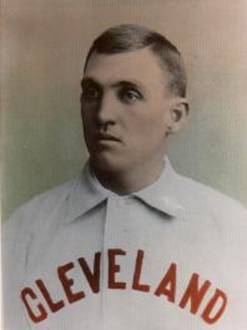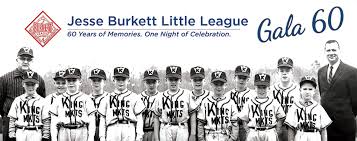Historical Hitter September 26 1896: Jesse Burkett

It seems the last week in September as the season is winding down for the teams that have not clinched a post season berth; the six month long team sport becomes a person game. The relationships between players and fans comes to forefront as the realization that the season or a career is about to come to an end. Updike famously wrote that while the Gods do not write letters, baseball history tells us that when pressed by the fans’ emotion, even the most stoic respond. The You Tube clip of Roger Maris’s 60th home run hit back in 1961 on this day is one occasion that even the most reluctant of players have the courage to make a curtain call. In Chicago, Paul Konerko showed that baseball gods do indeed know how to communicate via the written word. Last night internet videos illustrate the continuation of our National Pastime. For the contemporary fan, my former neighbors from my hometown, and to personally spite Keith Olbermann, Derek Jeter came through.
 For the fans a generation or two generations ago, for the vital few of both Negro League and National League fans, Willie Mays rose to the occasion as he always did, and moment of thanks, reflection, and remembrance the greatest of baseball heroes was driven around the warning track in San Francisco.
For the fans a generation or two generations ago, for the vital few of both Negro League and National League fans, Willie Mays rose to the occasion as he always did, and moment of thanks, reflection, and remembrance the greatest of baseball heroes was driven around the warning track in San Francisco.
In Cleveland on this day in 1896 a baseball hero rose to the occasion. In the October 3 edition of the Sporting Life, Elmer E. Bates wrote about the Lake City’s greatest hitter:
BUUKETT’S GREAT BATTING.
Jesse Burkett lost nothing by being “gamey.” When the decisive game that established Cleveland’s position in second place had been played Captain Tebeau told Jesse he might lay off if lie wished and keep his batting average up to its then high mark;.
“No,” Said Jess. “I’ll play it out. I don’t want to be called a quitter.”
As we can see from the box score from Sporting Life of October 3 1986, the game of September 26 shows the extent of Burkett’s courage: 3 for 4 with a run scored! His presence no doubt helped lead the Old Spiders to victory, 3 to 2. The box score data does not lie, Burkett is no quitter.
 1896 was Burkett’s best season he hit .410, and led the league in seven basic categories: games played, plate appearances, at bats, runs scored, hits, total bases, and batting average.
1896 was Burkett’s best season he hit .410, and led the league in seven basic categories: games played, plate appearances, at bats, runs scored, hits, total bases, and batting average.
As a member of Cleveland’s Spiders, Burkett was a superhero on a team that featured Hall of Famer Cy Young and twenty-game winner Nig Cuppy, Cupid Childs and Chief Zimmer. The year before in 1895 the Spiders were baseball best winning the Temple Cup.
The 1896 Spiders were an experienced and veteran team that finished second to the Baltimore Orioles. 1896 was year that did not feature a Temple Cup post-season playoff, but in their end of season exhibition with Cincinnati, the Clevelanders did well and scored 66 of a total 125 runs in this series.
Baseball in Cleveland has been played for many years, albeit not with as much success. Mets fans can rejoice thanks to 19th century “dastardly” ownership of the old Cleveland Spiders’ deliberate sell off and blatant trades created a team so poor that the Mets only have the 6th worst record.
As one of Cleveland’s baseball heroes we go back to 1896. On this day Hall of Famer Jesse Burkett gets three hits to finish the season at .410. Thus he becomes the first player to hit .400 consecutive seasons. In Cleveland baseball history Shoeless Joe Jackson hit over 400 in 1911, and just missed repeating that by hitting .395 in 1912. Burkett was one the game’s best hitters on the 19th Century and hit over .400 three times. As an ideal bunter, and one of the best players in bat control, Burkett once bragged that he could hit .400 one year just by bunting (that was in the era when a two strike foul bunt was not a strike out). He was a feared singles hitter with an intensity unmatched by few; 80% of 2850 hits were singles and combined with 1029 walks, made him an ideal lead off hitter.
Not a media darling or friendly player Burkett earned the nickmane of “Crab.” In baseball of the pre-World War One era, highlighted by nasty players unabashed for showing a level of intensity that would make Pete Rose a misbehaving school boy with a bad haircut; and on the field unsportsmanship-like behaviors that would make NFL players jealous, Burkett was King.
In 1906, one publication rendered a Burkett tirade this way: “Why you blank, blankety blank, do you know what I think of you? I think you are the blankest blank blank that ever came out of the blank blankest town in the blank blank land. You ought to be put in a museum.”
Just in case the point is not made with the above quote, the below quote is sourced from an entire paragraph describing Burkett’s behavior.
During his major league career, Burkett was once benched for throwing a baseball at a crowd of hecklers in the stands. On the field, “The Crab” was regarded by many as the meanest player on the infamously rowdy Cleveland Spiders, “and Crab Burkett’s claws were in every rhubarb,” one writer recalled. “Even when he was hitting .400, he played ball with a perpetual scowl.” On August 4, 1897, the Spiders were forced to forfeit the opening game of a doubleheader to the Louisville Colonels after Burkett refused to leave the field following his ejection from the game. In the second game of the doubleheader, Burkett was again ejected for arguing with the umpire, who then called two policemen to have Burkett forcibly removed from the grounds.
As we know, life is complicated and there is another side to the story. Burkett hit like few others. Elected to the Hall of Fame in 1946 by the Veterans committee the Hall’s web site notes Burkett as baseball’s elite batter of the period.
Jesse Burkett compiled a .342 lifetime average, topping the .400 mark three times. Playing in over 2,000 games in a career that spanned the 19th and 20th centuries, Burkett had 200 or more hits during six seasons and totaled 2,872 hits, second only to Cap Anson during this period. An adept bunter, he claimed he could have bunted for a .400 average following the rules of 19th-century baseball.
Simply put, Jesse Burkett is one of Cleveland’s baseball- best, and one old Spider that has been forgotten over the years.
His jumping leagues from the National Clevelanders for more pay with the upstart American League St. Louis Browns is noted as the beginning of the end for the National league in the Forest City.
 Burkett’s tirades while not welcome between the lines, few doubted his devotion to the sport. He was a minor league owner, team coach- which ended unsuccessfully and then scout. His personal standards of sobriety coupled with old- fashioned Puritan business values, and high level of personal honesty lead him to live well after retirement. In his retirement Burkett lived Worchester MA. He bought minor league team, employed as a highway inspector for Mass DOT, and a fixture in the community. Finally, as a sigh of respect and Hall of Fame membership the Little League of Worchester is named after him. There is little information available if these Bay State Little Leaguers are noted for Burkett’s usage of on the field colorful language.
Burkett’s tirades while not welcome between the lines, few doubted his devotion to the sport. He was a minor league owner, team coach- which ended unsuccessfully and then scout. His personal standards of sobriety coupled with old- fashioned Puritan business values, and high level of personal honesty lead him to live well after retirement. In his retirement Burkett lived Worchester MA. He bought minor league team, employed as a highway inspector for Mass DOT, and a fixture in the community. Finally, as a sigh of respect and Hall of Fame membership the Little League of Worchester is named after him. There is little information available if these Bay State Little Leaguers are noted for Burkett’s usage of on the field colorful language.
Organized professional baseball goes back to 1879 of being played along the south shore of Lake Erie with teams known as the Blues, Spiders, Naps, Bronchos, Indians, and a team even older known as the Forest Cities.
No fan base has suffered so long and by just about from every means possible and the teams and its fan has suffered through players tragedies like no other franchise. Yet despite such popular poor performances and only two World Series wins, the Tribe actually have a better record than their more famous southern instate neighbor: The Indians have played 17,794 games, won 9,014 lost some 8,689 and has a winning percentage of .509; The Porkopolis nine’s winning record is just .508.In baseball just a thousand of a decimal does count, so it Cleveland to the forefront.
When the records of all those teams are added up, Cleveland’s big league baseball teams have actually won over 10,000 games: the record is 10083 wins against 9926 losses for a winning percentage of .504. The resultant net difference is 157 games over .500. By comparison, the Fightin’ Phillies cumulative record is 20,124 games played with a meager 9,463 victories achieved, 10,549 losses gained resulting in a glorious winning percentage of .473; only 1086 games below .500. Thus with we could claim that Cleveland baseball is 1,243 games better than anything played in the city of Brotherly Love. Of course, posting such a statement is a manifestation of anything but an act of Brotherly Love.
[divider]
Sources:
Mark Hodermarsky: “Jesse Burkett: Cleveland’s Forgotten Legend”, in Brad Sullivan, ed.: Batting Four Thousand: Baseball in the Western Reserve, SABR, Cleveland, OH, 2008, pp. 16-18.
SABR BioProject by David Jones, http://sabr.org/bioproj/person/53d6808e
Baseball-reference.com
Baseball Almanac.com
Baseball Hall of Fame, http://baseballhall.org/hof/burkett-jesse
